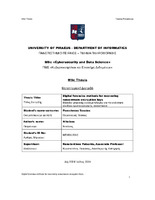Digital forensics methods for recovering ransomware encryption keys
Μέθοδοι ψηφιακής εγκληματολογίας για την ανάκτηση κλειδιών κρυπτογράφησης ransomware

Master Thesis
Συγγραφέας
Tassios, Paraskevas
Τάσσιος, Παρασκευάς
Ημερομηνία
2024-07Επιβλέπων
Patsakis, ConstantinosΠατσάκης, Κωνσταντίνος
Προβολή/
Λέξεις κλειδιά
Digital forensics ; Ransomware ; Frida tool ; Memory forensics ; CryptoAPI hookingΠερίληψη
Το ransomware έχει αυξηθεί σταθερά σε κλίμακα, κόστος, πολυπλοκότητα και αντίκτυπο από τότε
που πρωτοεμφανίστηκε πριν από σχεδόν 35 χρόνια. Οι ειδικοί ασφαλείας εμπλέκονται συνεχώς σε
μια μάχη με τους προγραμματιστές ransomware, προσπαθώντας να προστατεύσουν την ψηφιακή
τους υποδομή από αυτές τις επιθέσεις. Πρόσφατες παραλλαγές ransomware έχουν αρχίσει να
χρησιμοποιούν έναν συνδυασμό συμμετρικής και ασύμμετρης κρυπτογράφησης για το κλείδωμα
των αρχείων των χρηστών. Αυτή η μεταπτυχιακή διατριβή διερευνά εάν μπορούν να
χρησιμοποιηθούν ψηφιακές εγκληματολογικές τεχνικές για την αποκάλυψη των κλειδιών
κρυπτογράφησης που χρησιμοποιούνται από τέτοιο κακόβουλο λογισμικό. Για τη διεξαγωγή αυτής
της έρευνας, δημιουργήθηκε ένα ασφαλές και απομονωμένο εικονικό περιβάλλον όπου
εκτελέστηκαν διάφορα δείγματα ransomware. Στη συνέχεια, η μνήμη από τα μολυσμένα συστήματα
καταγράφηκε και εξετάστηκε χρησιμοποιώντας δύο διαφορετικά εγκληματολογικά εργαλεία για τον
εντοπισμό των συμμετρικών κλειδιών κρυπτογράφησης που χρησιμοποιούνται από το
ransomware.Επιπλέον, όταν οι εγκληματολογικές αναλύσεις μνήμης δεν απέδωσαν αποτελέσματα,
χρησιμοποιήθηκε μια εναλλακτική μέθοδος που περιλαμβάνει το CryptoAPI hooking με το εργαλείο
Frida. Η μελέτη εξέτασε δείγματα ransomware, συμπεριλαμβανομένων των Jigsaw, NotPetya,
Thanos, Gpcode, WannaCry και Phobos σε δύο διαφορετικά λειτουργικά συστήματα. Αυτά τα
δείγματα επιλέχθηκαν λόγω της υψηλής δημοσιότητας τους, των σημαντικών απαιτήσεων λύτρων
και της σημαντικής διατάραξης που προκάλεσαν σε πολλούς οργανισμούς. Η έρευνα έδειξε με
επιτυχία ότι είναι δυνατό να ανακαλυφθούν τα κλειδιά κρυπτογράφησης που χρησιμοποιούνται από
αυτά τα δείγματα ransomware. Τα ευρήματα, μαζί με τις προκλήσεις που αντιμετωπίστηκαν κατά τη
διάρκεια της έρευνας, παρουσιάζονται στην παρούσα διατριβή.


